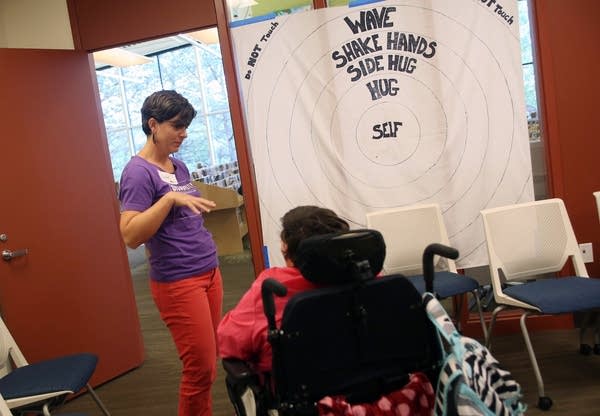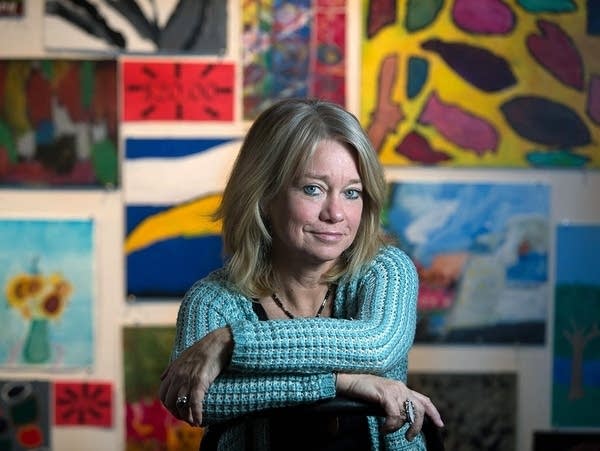Minn. nonprofits serving people with disabilities hustle to stay connected

Go Deeper.
Create an account or log in to save stories.
Like this?
Thanks for liking this story! We have added it to a list of your favorite stories.
Normally, Matt Guidry would be interacting with a room of about a dozen students who have mental and physical disabilities. But now, he teaches alone with a video camera, encouraging his class to get in touch with their emotions through movement.
When the coronavirus forced the Minneapolis-based nonprofit Upstream Arts, founded by Guidry and his wife, to temporarily shut down their in-person classes, they quickly pivoted to a virtual classroom. The couple uploaded several videos to the organization’s YouTube channel in recent weeks, knowing their clients desperately needed them at this moment.
For arts organizations like theirs, the COVID-19 pandemic hasn’t upended their mission to use the creative arts to help people with disabilities lead richer, fuller lives. But it does mean getting creative with how to deliver their services, even as they worry about their financial future.

Guidry’s wife, Julie, said people with disabilities are often isolated from the rest of society, and now they’re feeling it more than ever. She said she sees it in her own son.
Turn Up Your Support
MPR News helps you turn down the noise and build shared understanding. Turn up your support for this public resource and keep trusted journalism accessible to all.
“Even two weeks before the state of Minnesota started to put restrictions on how people moved around spaces, our child was already segregated from his community in his group home because of the compromised immune system that he lives with every day,” she recalled.
For example, Upstream Arts shuttered their physical classes on a Friday, moved to the virtual world by the following Monday, and by the end of the week had produced new content and plans for their virtual classes for the following week, Julie Guidry said.
In a typical week before the pandemic, Upstream Arts staff taught 35 different classes to about 400 people of all ages with mental and physical disabilities.
Guidry is optimistic about reaching her clients online — a recent virtual class had 30 attendees — but she recognizes that for some of them, technology presents a barrier. And she’s worried about her group’s financial viability: Will schools and other facilities renew their contracts for a service that’s moved online?

In St. Paul, the people who run Interact Center for the Visual and Performing Arts are also worried. Before the pandemic, its clients — people with a range of mental and physical disabilities — came to the center several days a week to work as either visual or performing artists.
Even before Gov. Tim Walz issued a stay-at-home order last month, the center shut down to protect its clients, many of whom have underlying health conditions. Interact staff has delivered supply kits to its visual artists so they can keep making art at home. But the center is still working on how best to serve members of its theater company.
Actor Jeffrey Haas, a client, suffers from generalized anxiety and obsessive-compulsive disorder and hasn’t been able to go to Interact since February. It’s been a challenge for him.
“I'm not used to this,” Haas said. “I went to Interact on Tuesdays, Wednesdays and Thursday every week, and that was my routine. And now I don't have that. I also used to exercise in my building, but they've closed the exercise room, so I can't do that. So, it's hard. It's really, really hard.”
Haas said he’s spending most of his time alone watching movies.

Meanwhile Interact’s executive director, Jeanne Calvit, is working to figure out what financial help her organization qualifies for. The majority of Interact’s income comes from the Minnesota Department of Human Services and is based on how many people are served. Normally, if a client stays home, Interact doesn’t get paid, she said.
“I'm very concerned, she said. “I've known a lot of these artists since we opened our doors. And this is their lifeline. Getting out and doing their artwork and their theater is what gives them purpose and gives them connectedness in life.”
Calvit said she’s optimistic about possible loans and grants, but worries the aid may not come soon enough.


